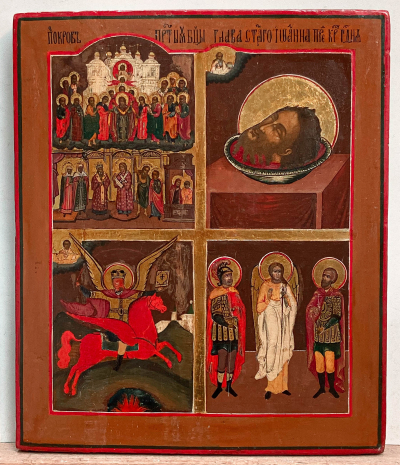The Protection (Pokrov) of the Most Holy Mother of God is one of the most beloved Feast days on the Orthodox calendar, commemorated on October 1, celebrating the appearance of the Virgin Mary in Constantinople in the 10th century at the time when the people in the city were threatened by the Barbarian invasion. Saint Andrew, the Holy Fool with his disciple Saint Epiphanius, and a group of people, saw the Mother of God, Saint John the Baptist, and several other Saints and Angels during a vigil in the Church of Blachernae, nearby the city gates. The Mother of God approached the center of the church, knelt down and remained in prayer for a long time with her face drowned in tears. Then she took her veil off and spread it over the people as a sign of protection. After the appearance of the Mother of God, the danger was averted and the city was spared from bloodshed and suffering. On the icon, the Theotokos is depicted standing on a cloud in an aureola of green light with city walls behind her holding her veil surrounded by apostles, saints, and two angels behind her. Below are Saint Romanos the Melodist, Saint Epiphanius and Saint Andrew the Fool.
The Severed Head of Saint John the Baptist, known in Russia as "Saint John the Forerunner", the forerunner of Christ, the last of the prophets, and the first Christian saint. A popular and much-venerated figure in Orthodox iconography, Saint John was beheaded under the order of King Herod, who wished to please Salome, daughter of the king's lover Herodias, whom the Baptist had criticized for her adultery. The saint's severed head is depicted on the platter, shrunken in the sleep of death.
The Holy Archangel Michael is one of the most celebrated of the Angels called the Archistrategos, or chief commander, of all the bodiless powers. According to the Holy Scripture and Tradition, he has interceded for humanity multiple times and continues to serve as the Defender of the Faith. Saint Michael is most often invoked for protection from invasion by enemies and from civil war, and for the defeat of adversaries on the field of battle. Saint Michael is depicted riding a red winged horse carrying the book of Gospels, the Trumpet of Judgement, the censer and a lance, with which he conquers the demon depicted on the lower right. Next to the winged demon is a depiction of a city of Babylon drowning in sins. The white semi-circle between his hands represents his covenant with God.
In Orthodoxy, a Guardian Angel is a type of angel that is assigned at birth to protect and guide a particular person. Each human has a guardian angel who stands before the face of the Lord. This guardian angel is not only a friend and a protector, who preserves from evil and who sends good thought; the image of God is reflected in the creature—angels and men—in such a way that angels are celestial prototypes of men. Guardian angels are especially our spiritual kin. Scripture testified that the guardianship and direction of the elements, of places, of peoples, of societies, are confined to the guardian angels of the cosmos, whose very substance adds something of harmony to the elements they watch over.








 Поменять язык на русский
Поменять язык на русский 